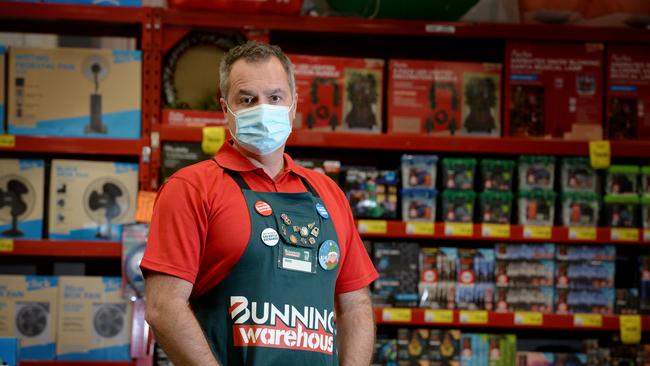Bunnings has streamlined its merchandising team and held the first suppliers forum since Covid-19 began
The hardware giant has overhauled its merchandising and held the first mass-meeting of suppliers since Covid-19.

Bunnings is overhauling its merchandising operations as soaring inflation threatens to cut household spending on hardware and DIY products.
Jennifer Tucker, the recently appointed merchandising director at the Wesfarmers-owned hardware chain, has cut down her direct merchandise reports from three to two, now grouping the dozens of categories that Bunnings has on offer under its big-box retail format into “building” and “home & lifestyle”.
That will, it is hoped, focus the retailer’s quickly expanding offers in furniture storage, garden decor, kitchen and bathroom, which Bunnings chief executive Michael Schneider believe will be increasingly popular categories in coming years.
In a letter to suppliers, obtained by The Australian, Ms Tucker told Bunnings suppliers the restructure of the chain’s merchandising teams would help drive growth and “simplify the way we work”.
“This simplification of our structure will position us to accelerate our growth strategy in our commercial (tradies) business while also driving our core DIY business,” Ms Tucker wrote.
The move to having two merchandise pillars will see the reorganisation of category teams into these two new portfolios.
Under the restructure from three merchandising divisions to two, Adrian Pearce will lead the “home and lifestyle” portfolio and Cam Rist will lead the “building” portfolio. As a result Tracey Lefebure will leave Bunnings following a career with Wesfarmers of some 34 years.
Ms Tucker’s decision to rationalise the teams under her replaces the structure set up by the former Bunnings merchandise director Phil Bishop, who was appointed as the CEO of discount retailer The Reject Shop.
Bunnings held a supplier forum earlier this month — its first in-person mass meeting with suppliers in over two years — where issues around Bunnings’ strategic agenda and the continued focus on merchandise strategies were fleshed out.
For these suppliers that attended the forum, of which 450 were in person and 350 people online, Bunnings laid out merchandise growth opportunities around deepening and evolving its range for both consumer and commercial markets.
For the consumer, suppliers were told Bunnings was keen to expand its depth across existing product categories, with particular opportunities in room and furniture storage, garden and garden decor, and kitchen and bathroom. New growth opportunities were also revealed to be in in-home services, pet durables, recreation and the online Bunnings Marketplace.
The first large-scale suppliers meeting since Covid-19 emerged followed the Wesfarmers strategy day in early June.
The suppliers were told Bunnings believed that broader consumer growth will come from driving the core pillars across lowest prices, widest range and best experience. From a commercial range point of view, focused on tradies, it will be about better catering for each stage of the build and the needs of specialist trades.
This broader commercial growth will be focused on digitising the customer experience, continuing to roll out its new retail banner Tool Kit Depot, leveraging and growing the recently acquired Beaumont Tiles business, and evolving the PowerPass transaction program.
Commercial growth will also get a boost from expanding Bunnings’ frame and truss production capacity. The Australian revealed earlier this year that Bunnings will over the next 18 months seek to double the number of processing plants it owns that manufacture wooden frames and trusses used in home construction, substantially growing its market share in a high-growth category that faced shortages through Covid-19.
During the recent forum, Bunnings also discussed opportunities for its suppliers to partner with it on product innovation and new solutions to address the opportunities the hardware giant sees in the market.



